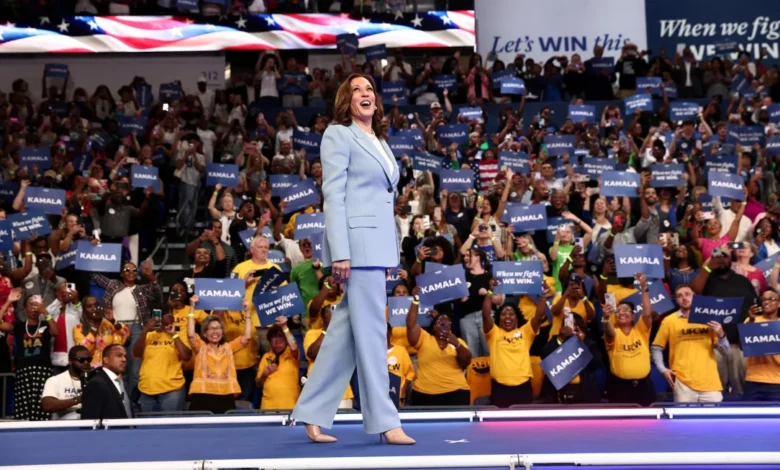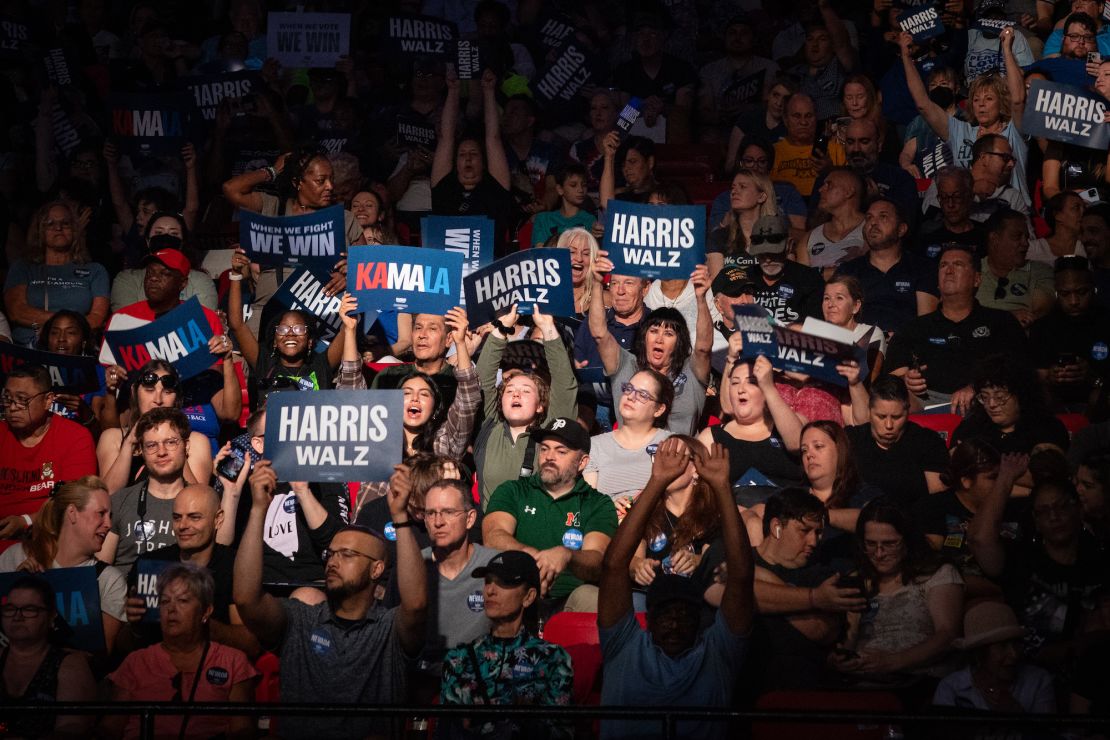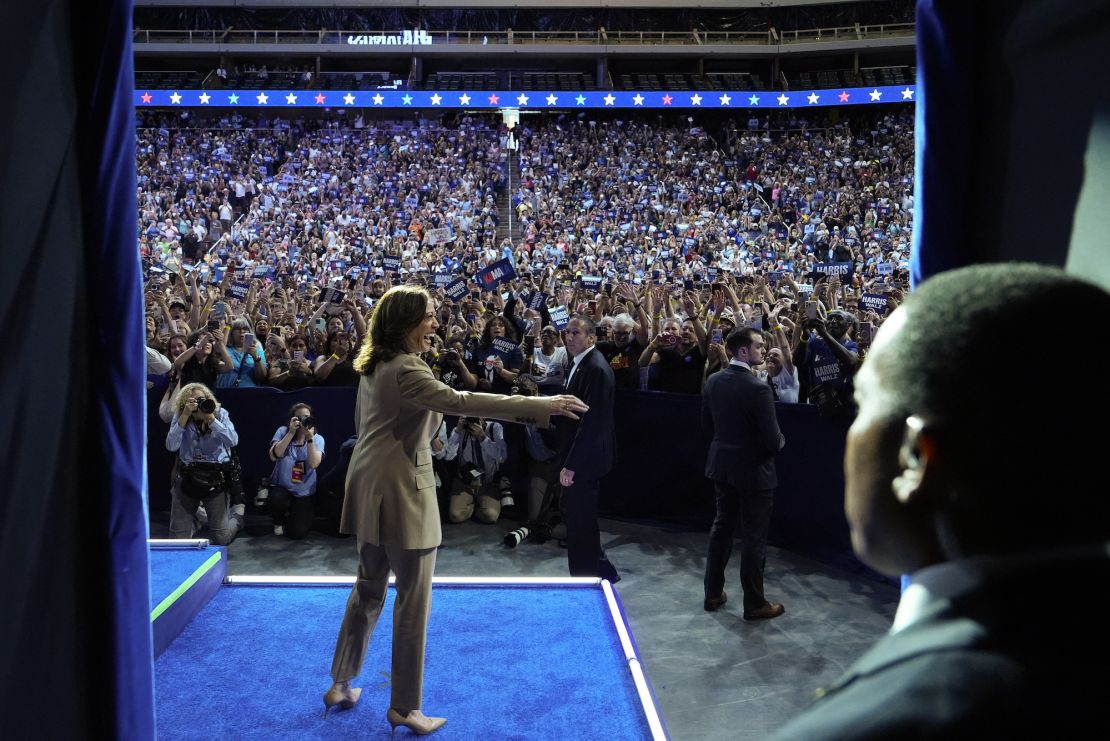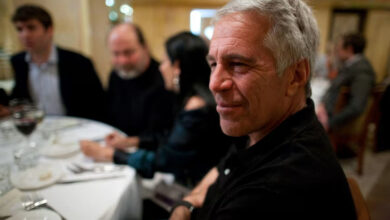
Over the line came a lot of praise, but also some suggested tweaks. First, said veteran Democratic numbers man Geoff Garin, summarizing their analysis, stop saying, “We’re not going back.” It wasn’t focused enough on the future, he argued. Second, lay off all the “weird” talk — too negative.
Harris’ advisers listened. They considered the arguments. They decided to stick with what the crowds were chanting in the arenas.
When advisers who had been on the call briefed the vice president on the suggestions, according to CNN’s conversations with close to a dozen people involved with internal campaign decisions, she told them she wasn’t going to listen to the pollsters herself and would instead trust the instincts she had buried under self-doubt for so long.
Harris has shocked even people close to her with how she’s been coming across in the just four weeks since she became a presidential candidate. Many political obsessives who had largely written off the vice president can’t understand how a woman whose early struggles they still keenly remember is now projecting as succinct and punchy, comfortable onstage and in her own skin.
Part of this is a strategic decision to limit her appearances and hold off from sitting for an interview, so that her only major moment without a teleprompter or aides first editing video was on the tarmac at Andrews Air Force Base as she greeted the Americans returning home in President Joe Biden’s multilateral prisoner swap. A snippet of her jumbled syntax was quickly pumped out by Republican National Committee operatives and others: “This is just an extraordinary testament to a president who understands the power of diplomacy and understands the strength that rests in understanding the significance of diplomacy and strengthening alliances.”
And while several Democratic officials told CNN privately that the turnaround for a politician whose weaknesses haven’t magically disappeared may be setting the party up for devastation if she stumbles, Harris isn’t just feeding off the burst of Democratic good feelings that followed Biden’s exit. She’s feeling a sense of liberation campaigning for herself rather than calibrating around Biden.
“This is her clear voice. When she says, ‘I will sign this into law,’ those are words she has never been able to be speak before,” said her deputy chief of staff, Erin Wilson, who for the last two years helped manage many of Harris’ political relationships.
“It was her job to be that strong partner that Joe Biden needed in his administration,” said Daniele Monroe-Moreno, the Nevada Democratic Party chair and a state representative who has known Harris since before she was vice president. “The spotlight is on her now, and this is her time. And you sense that she has a renewed sense of confidence.”
Harris is also reaping the benefits from years of a quietly revamped internal operation and a small circle of advisers she tends to meet with at her dining room table at the Naval Observatory, which remains the nexus of power, while the staff still in the headquarters Biden established in Wilmington, Delaware, manages the campaign operations.
Those are the people she talks to. Those are the ones who, while the Biden campaign wasn’t much testing what his running mate should say, were coming up with their own debate prep plans, which were already underway by the time Biden took the stage for his.

A brain trust around her dinner table, separate from Wilmington HQ
Unlike Harris’ last campaign — which imploded in a swirl of self-doubt, second-guessing and rival factions pulling and pushing her over ideas and wording — this one has been defined by the shortness of the race. She hasn’t had time for any of the old lingering. She hasn’t had time to try to work any new people into her circle of trust.
The result — despite a politician who had developed a reputation for word salads and hedging herself into incomprehensibility — is the least message-tested Democratic presidential campaign in decades. Rather than honing a stump speech over months on the trail, Harris had about 26 hours between finding out she’d be running and having to deliver hers for the first time, at her new campaign headquarters in Wilmington, and it was carried live on national TV.
Most of its paragraphs and themes came right out of those prep sessions overseen by Harris’ chief of staff, Lorraine Voles, and shaped by volunteer consultant wordsmith Sean Clegg, former policy adviser Rohini Kosoglu and longtime Democratic debate expert Karen Dunn. Overnight, Brian Fallon, who joined the orbit only in January as Harris’ campaign communications director, scrapped together lines she had come up with and others they had helped craft for her.
Even what’s become one of her trademarks — “I know Donald Trump’s type” — was a last-minute revision.
“I want to say something like, ‘I know his type,’ but more eloquent,” Harris said, standing in a hold room in Wilmington, looking over the prepared paragraphs about her prosecutorial record, according to people in the room.
“Just say that: ‘I know Donald Trump’s type,’” her communications director, Kirsten Allen, said back.
By the time she was doing her run-up to it at a Philadelphia rally two weeks later, the crowd started cheering before she even got to the punchline.
To Anita Dunn, the recently departed top Biden adviser, how Harris is coming across on the trail should be a surprise only to those who hadn’t been watching her diligent efforts to reboot.
Harris’ set of experiences, Dunn said, lend her two particular advantages in this moment.
“There is nothing that prepares you to run for president like running for president. Two, she has been vice president for three and a half years, and that gives her a depth and foundation to run from that is difficult to replicate,” Dunn said. “And she doesn’t have the usual problems that vice presidents do of being seen as more of the same because she so clearly is communicating change.”

Forced out of her early psychological bunker
Bruised and brewing from her first year as vice president, Harris didn’t trust Biden’s West Wing aides. She didn’t trust reporters. She didn’t trust her own instincts.
The plan was to gear up for a 2028 run that boxed out primary opposition. The main component was getting Harris out of the psychological bunker she had retreated to.
Voles, an aide with presidential experience going back to the Clinton years and who had the trust of Dunn, joined as an adviser in the summer of the first year, trying to tweak the chaos. Voles’ elevation to chief of staff in April 2022 reflected Harris’ recognition that she needed a reboot that went deeper than replacing the top press aides and others who had already cycled through.
Some of the changes were operational, such as merging the scheduling and advance teams, or building up an in-house online outreach operation. Some were strategic, like forcing Harris to agree to more interviews despite her resistance, both to get her more practice and to dilute the impact when she inevitably made mistakes. Some were about injecting a different spirit: Aides talked about needing to remember who she was, the strengths that put her on the ticket to begin with and her ability to connect with voters once she stepped out of the background.
By late summer 2022, with Covid-19 fading and Biden largely finishing a legislative agenda that had often kept Harris in Washington on standby to break ties in the Senate, she told aides she wanted to be on the road at least two days a week (and most Saturdays) ahead of the midterms. Biden had given Harris the portfolios of the root causes of migration and voting rights, but after the Supreme Court’s decision overturning Roe v. Wade, she had quickly identified herself as the face of the fight for abortion rights. She and aides zeroed in on other issues that likewise spoke to the Democratic base, and specifically the rising generation: climate, small business and maternal health.
Aides turned Harris’ abortion rights focus into its own organizing tool. Though there were a few rallies, she more often took meetings in Washington or on the road with groups of faith leaders and state legislators. All aimed to have attendees walk away with a warmer impression of her. Speeches hadn’t been going well for Harris, so aides shifted to moderated conversations to draw her out in front of friendly crowds, hoping for moments they could clip and post.
Guests who Wilson, the deputy chief of staff, and other aides identified as likely future convention delegates or potential primary opponents were booked onto Air Force Two. Every airport arrival was stacked with officials for her to greet; every photo line after events was curated with local politicians, business owners, student leaders. Receptions at the Naval Observatory ramped up to the point that by the Christmas 2023 season, she had two and a half weeks of sometimes multiple events per day — chosen crowds coming through for a hot chocolate bar, a photo with her and first gentleman Doug Emhoff, and a souvenir apron.
“When you’re building a car, if you put the gas in the tank, it’s going to move,” said Megan Jones, a veteran of the Harry Reid machine in Nevada who worked on Harris’ last campaign, then joined her office in 2022 as an adviser to help manage her politics. “We just needed the gas — because we built it.”
Jones came up with the idea of branding Harris with college tours and organized them with a new senior adviser, Stephanie Young. The tours provided not just built-in audiences and a way to make multiple stops around the same theme, but also put the vice president in front of a group that would make up a larger share of the electorate by the time Harris’ team was expecting the next primaries.
The vice president would often talk about how college students had other places they could go and professors lecturing to them — “They get that in their college classes all day,” Harris said at one point, according to an aide.
Aides responded that meant Harris was going to have to learn how to be entertaining. They stressed message discipline. Repetition. Hitting easy themes like “freedom,” and talking less about the bills Biden passed than their specific provisions — her godchildren, Harris would say in meetings, had no idea what the Inflation Reduction Act was, but they know about replacing lead pipes and tax credits for buying electric cars. More conversations on the road made her more anxious that what Biden was saying wasn’t resonating. He wasn’t speaking to people in ways that they wanted to be spoken to, she’d say, according to advisers.
Throughout, Voles, who had a campaign communications background, backed the new press team’s efforts to push Harris out more. They abandoned an early decision that she shouldn’t speak to reporters off the record on Air Force Two because Biden did only sometimes. So too with a general rule against doing local interviews when Harris’ press secretary, Ernie Apreza, made them a pet push.
“POTUS doesn’t do local interviews because it muddles the message,” one aide warned, according to memories of the conversation.
“POTUS is POTUS,” another aide responded. “We don’t have that luxury.”
Harris put in her own request: more drive-time radio.
But mostly, they stayed away from traditional political interviews and toward influencer conversations and targeted constituency media such as podcasts. Several aides acknowledge now to CNN they were building “echo chambers.”
The little data Harris advisers had, including a round of focus groups conducted in the early spring, confirmed what they had assumed: She was doing better among the young voters, Black voters and Latino voters with whom Biden was struggling. Looking at data from Michigan, Wisconsin and Nevada, they could see the efforts paying off.
Harris knew if Biden lost to Trump, her political career would probably be finished too.
“Our two destinies are tied,” she told advisers a few times, several recounted.
Voles and campaign chief of staff Sheila Nix tried to guide Harris and the other aides along that balance. Yet even through July, worries among some Biden aides that she’d flop were intense enough to be among the factors keeping him from dropping out. They weren’t the only ones: Through the spring, multiple top Democratic operatives were still so skeptical of Harris and her staff’s abilities that they were telling CNN they doubted she would have been able to survive the Democratic primaries in 2028.
Context is everything for this run, and that’s especially true of Harris’ laugh. For years, Republicans and supportive media outlets caricatured it as forced. Often, political opponents referred to it as a “cackle.” Now her campaign is promoting it as emblematic of the joyous spirit she is trying to project.
“The quirks and her humor and the way that she presents,” said Robert Garcia, the freshman California congressman who got close to his then-junior senator when he was still the mayor of Long Beach, “people today are finding endearing and hopeful.”




